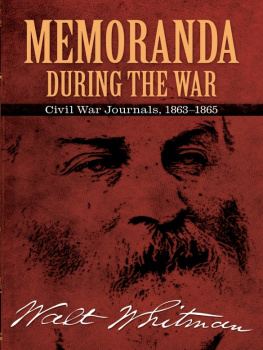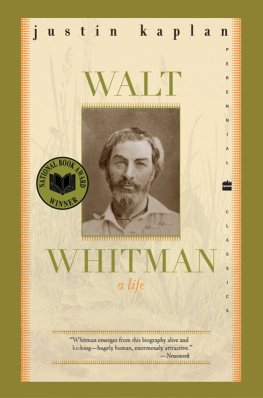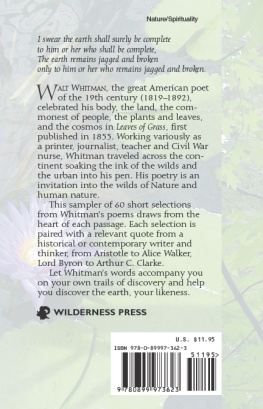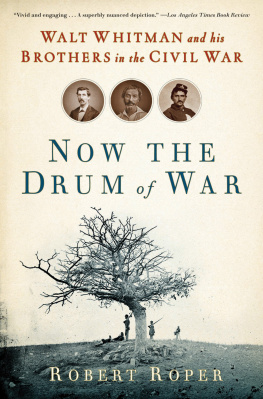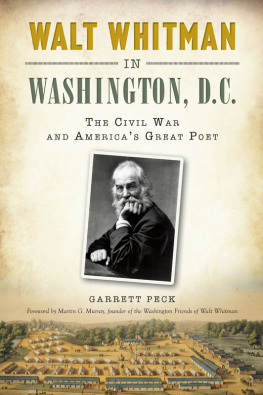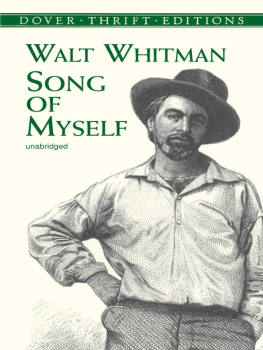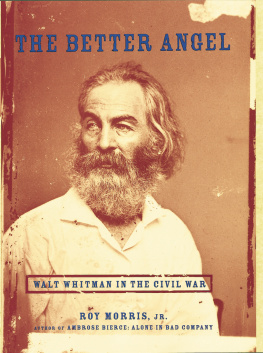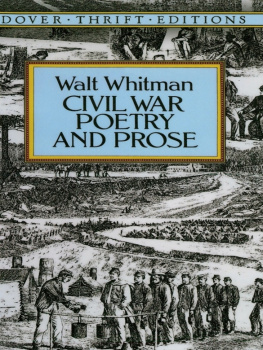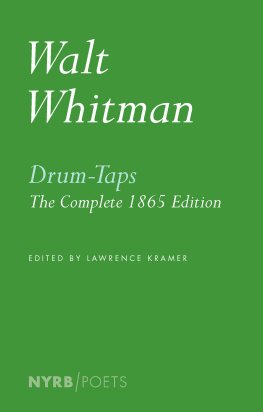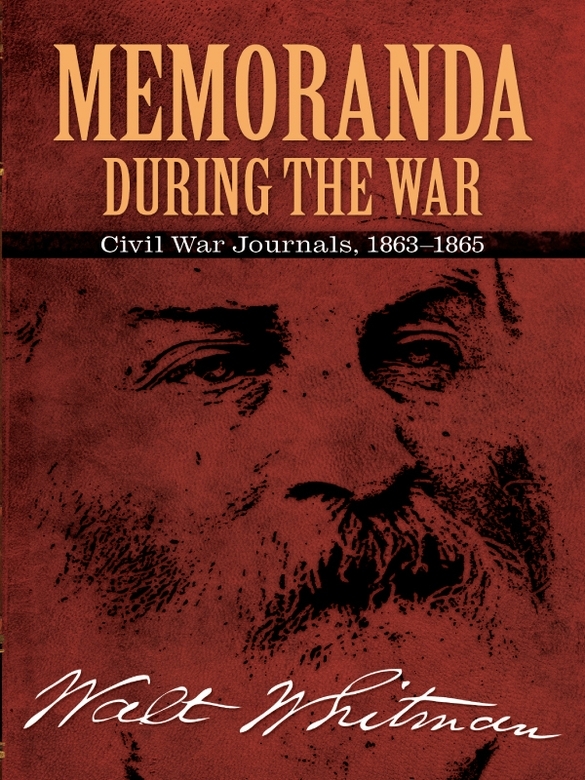Convulsiveness.
As I have lookd over the proof-sheets of the preceding Memoranda, I have once or twice feard that my little tract would prove, at best, but a batch of convulsively written reminiscences. Well, be it so. They are but items, parts of the actual distraction, heat, smoke and excitement of those timesof the qualities that then and there took shape. The War itself with the temper of society preceding it, can indeed be best described by that very word, Convulsiveness .
Typical Soldiers.
Even the typical soldiers I was personally intimate with, and knew wellit seems to me if I were to make a list of them it would be like a City Directory. Some few only have I mentiond in the foregoing pagesmost are deada few yet living. There is Reuben Farwell, of Michigan, (little Mitch;) Benton H. Wilson, color-bearer, 185th New York; Wm. Stansberry; Manvill Winterstein, Ohio; Bethuel Smith; Capt. Simms, of 51st New York, (killd at Petersburg mine explosion,) Capt. Sam. Pooley and Lieut. Fred. McReady, same Regt. Also, same Regt., my brother, Geo. W. Whitmanin 61 a young man working in Brooklyn as a carpenterwas not supposed to have any taste for soldieringbut volunteerd in the ranks at once on the breaking out of the Warcontinued in active service all through, four years, re-enlisting twicewas promoted, step by step, (several times immediately after battles,) Lieutenant, Captain, Major and Lieut. Colonelwas in the actions at Roanoke, Newbern, 2d Bull Run, Chantilly, South Mountain, Antietam, Fredericksburgh, Vicksburgh, Jackson, the bloody conflicts of the Wilderness, and at Spottsylvania [sic], Cold Harbor, and afterwards around Petersburg. At one of these latter he was taken prisoner, and passd four or five months in Secesh military prisons, narrowly escaping with life, from a severe fever, from starvation and half-nakedness in the winter.
[What a history that 51st New York had! Went out earlymarchd, fought everywherewas in storms at sea, nearly wreckdstormd fortstrampd hither and yon in Virginia, night and day, summer of 62afterwards Kentucky and Mississippire-enlistedwas in all the engagements and campaigns, as above.]
I strengthen and comfort myself much with the certainty that the capacity for just such Regiments, (hundreds, thousands of them) is inexhaustible in the United States, and that there isnt a County nor a Township in The Republicnor a street in any Citybut could turn out, and, on occasion, would turn out, lots of just such Typical Soldiers, whenever wanted.
Before I went down to the Field, and among the Hospitals, I had my hours of doubt about These States; but not since. The bulk of the Army, to me, developd, transcended, in personal qualitiesand, radically, in moral onesall that the most enthusiastic Democratic-Republican ever fancied, idealized in loftiest dreams. And curious as it may seem, the War, to me, proved Humanity, and proved America and the Modern.
(I think I am perfectly well aware of the corruption and wickedness of my lands and daysthe general political, business and social shams and shysterisms, everywhere. Heaven knows, I see enough of themrunning foul of them continually! But I also see the noblest elements in societyand not in specimens only, but vast, enduring, inexhaustible strata of themruggedness, simplicity, courage, love, wit, health, liberty, patriotismall the virtues, the main bulk, public and private.)
Attack on Fort Sumter, April, 1861.
What ran through the Land, as if by electric nerves, and showd itself in stupendous and practical action, immediately after the firing on the Flag at Fort Sumterthe Nation (till then incredulous) flushd in the face, and all its veins fiercely pulsing and poundingthe armd volunteers instantaneously springing up everywherethe tumultuous processions of the regimentsWas it not grand to have lived in such scenes and days, and be absorbd by them, and unloosend to them?
The news of the attack on Sumter was receivd in New York city late at night, (13th April, 1861,) and was immediately sent out in extras of the newspapers. I had been to the opera in Fourteenth street that night, and after the performance, was walking down Broadway toward twelve oclock, on my way to Brooklyn, when I heard in the distance the loud cries of the newsboys, who came presently tearing and yelling up the street, rushing from side to side even more furiously than usual. I bought an extra and crossd to the Metropolitan Hotel (Niblos,) where the great lamps were still brightly blazing, and, with a small crowd of others, who gatherd impromptu; read the news, which was evidently authentic. For the benefit of some who had no papers, one of us read the telegram aloud, while all listend silently and attentively. No remark was made by any of the crowd, which had increasd to thirty or forty, but all stood a minute or two, I remember, before they dispersd. I can almost see them there now, under the lamps at midnight again.
The ensuing three MonthsThe National Uprising and Volunteering.
I have said in another place that the three Presidentiads preceding 1861 showd how the weakness and wickedness of rulers are just as eligible here in America under republican, as in Europe under dynastic influences. But what can I say of that prompt and splendid wrestling with Secession-Slavery, the arch enemy personified, the instant he unmistakably showd his face?......The volcanic upheaval of the Nation, after that firing on the flag at Charleston, proved for certain something which had been previously in great doubt, and at once substantially settled the question of Disunion. In my judgment it will remain as the grandest and most encouraging spectacle yet vouchsafed in any age, old or new, to political progress and Democracy. It was not for what came to the surface merelythough that was important; but what it indicated below, which was of eternal importance.......Down in the abysms of New World humanity there had formd and hardend a primal hardpan of National Union Will, determind and in the majority, refusing to be tamperd with or argued against, confronting all emergencies, and capable at any time of bursting all surface-bonds, and breaking out like an earthquake. It is indeed the best lesson of the century, or of America, and it is a mighty privilege to have been part of it.......(Two great spectacles, immortal proofs of Democracy, unequalld in all the history of the past, are furnishd this Warone at the beginning, the other at its close. Those arethe general Voluntary Armed Upheavaland the peaceful and harmonious Disbanding of the Armies, in the summer of 1865.)
Contemptuous National feeling.
Even after the bombardment of Sumter, however, the gravity of the revolt, and the power and will of the Slave States for a strong and continued military resistance to National authority, was not at all realized through the North, except by a few. Nine-tenths of the people of the Free States lookd upon the rebellion, as started in South Carolina, from a feeling one-half of contempt and the other half composed of anger and incredulity. It was not thought it would be joind in by Virginia, North Carolina or Georgia. A great and cautious National official predicted that it would blow over in sixty days, and folks generally believd the prediction. I remember talking about it on a Fulton ferry-boat with the Brooklyn Mayor, who said he only hoped the Southern fire-eaters would commit some overt act of resistance, as they would then be at once so effectually squelchd, we would never hear of Secession againbut he was afraid they never would have the pluck to really do anything........I remember too that a couple of companies of the Thirteenth Brooklyn, who rendezvoud at the City Armory, and started thence as Thirty Days Men, were all provided with pieces of rope conspicuously tied to their musket barrels, with which to bring back each man a prisoner from the audacious South, to be led in a noose, on our mens early and triumphal return! [This was indeed the general feeling, and came to the surface. Still, there was a very strong Secession party at the North, as I shall mention in a Note further on.]

